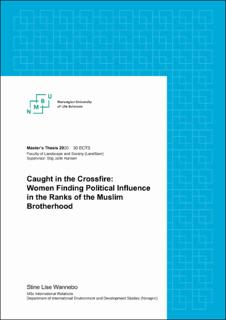| dc.contributor.advisor | Hansen, Stig Jarle | |
| dc.contributor.author | Wannebo, Stine Lise | |
| dc.date.accessioned | 2021-02-12T10:50:54Z | |
| dc.date.available | 2021-02-12T10:50:54Z | |
| dc.date.issued | 2020 | |
| dc.identifier.uri | https://hdl.handle.net/11250/2727691 | |
| dc.description.abstract | To find out about experiences, perspectives and assumptions other than your own, you need to ask questions to people different than yourself. It is not enough to look at them from afar or to generalise based on the knowledge you already hold. You need to ask. Academia has long registered that there is a rise in the number of women represented in Islamist parties following the Arab Spring. In countries such as Tunisia and Yemen, women were protesting alongside men in the streets as their equals, advocating for change in their thousands and believing they were experiencing an irreversible shift in attitudes towards the role of the Islamic woman in society. However, the transformation from participation to representation has yet to take hold. Political parties affiliated with the conservative but still moderate Islamist movement the Muslim Brotherhood have women within their ranks who have reached positions of political influence. In an ideological framework that denounces feminism as a Western secular import and sees women as the symbol of a cultural heritage that needs to be protected, how do female Islamists find a way to assert their influence? Much like the Muslim Brotherhood, these women are caught in the crossfire where tradition meets modernity. Through qualitative research based on three in-depth case studies, this study has found that Islamist women are not afraid to make their voices heard while also navigating a set of expectations and assumptions that is out of secular feminism reach. The data provided by the case studies have been analysed through the lens of Feminist International Relations, using feminist research methods to keep an eye out for any inherent liberal or secular assumptions. The result is a different outlook not only on Islamism but on the women who choose to exercise their freedoms within it. | en_US |
| dc.language.iso | eng | en_US |
| dc.publisher | Norwegian University of Life Sciences, Ås | en_US |
| dc.rights | Navngivelse 4.0 Internasjonal | * |
| dc.rights | Attribution-NonCommercial-NoDerivatives 4.0 Internasjonal | * |
| dc.rights.uri | http://creativecommons.org/licenses/by-nc-nd/4.0/deed.no | * |
| dc.subject | Islamism | en_US |
| dc.subject | Muslim Brotherhood | en_US |
| dc.subject | Feminism | en_US |
| dc.subject | Arab spring | en_US |
| dc.subject | International relations | en_US |
| dc.subject | North Africa | en_US |
| dc.subject | Middle East | en_US |
| dc.title | Caught in the crossfire : women finding political influence in the ranks of the Muslim Brotherhood | en_US |
| dc.type | Master thesis | en_US |
| dc.subject.nsi | VDP::Social science: 200 | en_US |
| dc.description.localcode | M-IR | en_US |

